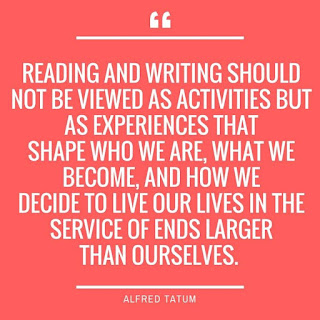As time has gone on, I've started to realize everything is a numbers game. Here are three on my mind.
The Arithmetic of Music
Anyone who has studied music has come across the "Circle of Fifths" -- a teaching device using mathematical ratios to learn the order of key signatures. Yeah -- I'm still learning as well.
This week when I met with my music teacher to try to figure out how to approach writing music for some lyrics, we referred to the Circle of Fifths. My music teacher can do all this in his head (as he should!) Me -- charts and graphs are my saviors. It will be a while before I feel comfortable understanding this chart, but it is a prime example of how math underlies music.
The Arithmetic of Reading
I've always been a reader, but the truth of the matter is that there have been whole swatches of time that not much reading got done. I felt I didn't "have time."
Last summer when trying to figure out how I would motivate young readers, I came across an idea that, with some modifications, I thought could work. I created the goal-setting bookmark. It's deceptively simple: read for 10 minutes, note how many pages you read in that time, multiple by two (arithmetic!), and there you have how many pages you can read in 20 minutes -- a reasonable amount of time to give to personal reading, right?
 |
| Ahead of schedule on Susan Orleans book! |
 |
| Student bookmarks from third quarter |
When I introduced this to my students, one of the first complaints was "This isn't math class." Ha ha. Little did they know the arithmetic of reading! Most students latched on to this right away, and some still find it particularly helpful. For others, it helped establish a reading habit, even as they abandoned making the bookmark.
Ever since I've committed to this process, I've been reading more than ever. I find I DO have time to read. I completed 38 books in total last year, and I thought that was pretty good. I set a public goal on Good Reads to read 60 books this year -- a number I felt was a stretch. At the beginning of March, I was already nearly one third of the way to my goal. I've upped it to 80, but even that will probably be too little.
And here is the thing -- I am more calm and relaxed than ever. I suppose this is for a number of reasons, but I have come to believe my commitment to reading has a lot to do with it. Usually by this time of the school year I'm stressed to the max, but not this year.
For years I looked at books and thought "Someday." Now I look at them just to decide which will be next for goal setting and completion. It's the arithmetic of reading that has made all the difference.
The Arithmetic of Compassion
I have been slowly making my way through Joan Halifax's book Standing on the Edge, where she dissects what she calls the "edge states" -- altruism, empathy, integrity, respect, engagement, and compassion. Today I read about "the arithmetic of compassion," which actually motivated this entire blog post. Without getting into a lengthy explanation, it goes something like this:
When faced with helping one person, we tend to respond. But once we know there is more than one, we are less likely to even help the first one. Paul Slovic, Ph.D continues the explanation:
Meeting that need no longer felt satisfying. Similarly, when the need for assistance is describes as part of a large-scale relief effort, potential donors would experience a demotivating sense of inefficacy arising from the thought that the help they could provide was just a 'drop in the bucket.' (232)
This is actually called "pseudo-inefficacy" -- the sheer numbers making a person feel ineffective, even thought that isn't reality. It's the perception that we can't really help that is a powerful de-motivator. This mental shutdown is literal. Joan says,
I have little doubt that our constant access to bad new today, via social media and online news sites, contributes to the psychic numbing, moral apathy, and a deficit of compassion. (232)
I know this to be true.
This caused me to think about our country, and how divided we are. I thought to myself, what is the face of the country for me? How can I stay focused on 'the one' so I don't get overwhelmed?
The answer was quick and obvious: it is my daily work with young people. My heart and soul filled with gratitude that I can do something every day that might have an influence. Every choice I make in my classroom matters to at least one of them. I believe that. I also know that many of the issues in our country, the choices being made now that I don't agree with at all will affect them much more than they will affect me. After all, global climate changes are said to begin to really show up in 2050 -- I expect to be long gone by then. But that 12-year-old in front of me will have to contend with it.
It's the Arithmetic of Teaching, I suppose. We won't reach them all; but like the extra cold calls made by a salesperson in order to increase chances of a sale, the more I focus on what I can do every day to help them be reading and writing literate, as well as socially literate, I'm doing a lot. If I do it with purpose. With love.With compassion.
P.S. And as I finished, this song came on my iTunes list -- an overlooked song of the 60's someone put the perfect graphics with. Even though it's a love song, it seems to fit. Enjoy.






No comments:
Post a Comment